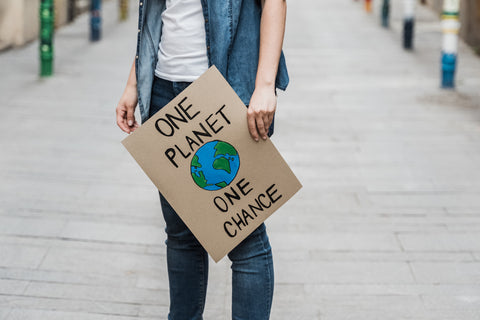Introduction to Earth Day 2024: a call for environmental action
As we approach Earth Day 2024, it's crucial to reflect on actions that contribute to a healthier planet. Urban gardening is not just a trend; it's a sustainable solution to modern environmental challenges. At Hexagro, we're committed to promoting urban gardens, using recycled bio-materials, and encouraging the reduction in the production of all plastics.
A brief History: How Did Earth Day Begin?
This global initiative, which began in 1970, continues to inspire actionable change, fostering a deep connection between individuals and the planet. It's a day to reflect on our environmental impact and commit to making lasting, positive changes to protect our world for future generations.
This year's Earth Day theme, "Planet vs. Plastic," underscores a pressing environmental crisis—plastic pollution. Plastics, once hailed as a marvel of modern technology, have become a pervasive threat to our natural world. From the deepest oceans to the highest mountains, plastic waste has left no corner of our planet untouched. It's a stark reminder of the consequences of unchecked consumption and the dire need for sustainable alternatives.
Celebrating Earth Day: our approach
To honor Earth Day, at Hexagro we want to share how we and our community of urban farmers daily support our beloved planet. We envision a world where everyone can grow and access healthy food through urban farming; a world where every space, from office areas to private homes, can become an urban garden, making healthy food accessible to everyone thanks to vertical farming solutions.
The Four Main Activities of Urban Farmers:

Living eco-friendly means understanding the sustainability of urban gardening. Did you know that 80% of arable land globally is already in use and 70% of the world's water consumption is tied to agriculture (FAO 2010)? By adopting vertical farming at home, you can grow your own vegetables using less space and water, significantly reducing your ecological footprint.
Introducing children to urban gardening is a powerful way to foster a sustainable and conscious lifestyle. Research conducted in the US (source) also shows that children who are involved in growing vegetables are more willing to eat them.With Hexagro, everyone can learn the art of gardening. Our digital guide, Hexbee, helps users of all ages through each step from setup to harvest, making gardening with kids a fun and educational experience.
Urban gardening helps cut down on unnecessary plastic waste. By growing your own herbs and vegetables, you avoid the plastic packaging typically found in supermarkets. Moreover, all Hexagro gardens are made from 100% recycled plastics and biocomposite materials from wood chips and rice shells, demonstrating our commitment to environmental sustainability.
Urban living often means limited access to nature, which can affect well-being. Integrating a garden into your daily life not only promotes healthier eating habits but also reduces stress, enhances productivity, and provides a restorative environment.
Growing zero-mile vegetables reduces CO2 emissions
Growing vegetables on your own balcony not only brings fresh produce right to your door but also significantly reduces greenhouse gas emissions. It's important to note that global food miles— the distance food travels from farm to consumer—account for nearly 20% of all CO2 emissions from food. Specifically, the transportation of fruits and vegetables contributes 36% of food miles emissions, which is about twice the amount of greenhouse gases released during their actual production.
Additionally, the choice of agricultural resources can also impact CO2 levels. For instance, peat is often considered an ideal substance for gardening due to its ability to retain moisture and nutrients. However, peat is not as sustainable as many might think. Peatlands, although only covering 3% of the global terrestrial surface, absorb twice as much CO2 as all the world’s forests combined. The extraction of peat threatens this delicate ecosystem, affecting both plant and animal species reliant on peatlands.
Therefore, it's crucial to consider more sustainable alternatives. Coconut fiber, for example, is an excellent, yet underutilized, eco-friendly and economical option for gardening substrates. Curious to learn more about it? Read our article, "Why Choose Coconut Fiber as a Growing Medium?"
Not just for the Planet, but for us all

Becoming an urban farmer with Hexagro not only benefits you and your family but also supports vulnerable communities in adopting sustainable agricultural practices. Allowing anyone to grow and access healthy food is a real mission for us and that’s why we have launched Siembra Vertical: Hexagro's social impact project based in Colombia. We transfer know-how and technology to developing countries to support local farmers and communities in adapting to the challenges of global warming and soil degradation.
Our mission there extends to scaling up our technology to develop larger configurations for small and medium-sized producers.
Now that you understand the positive impact an urban garden can have, why not start this Earth Day? Change your habits to support our planet, not just today, but every day. Discover how simple and rewarding gardening can be, and let it transform your life!
Subscribe to our newsletter to receive practical guides on urban farming and discover how you can make a difference with your urban garden alongside Hexagro.

